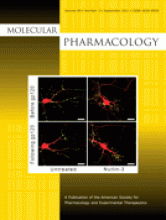Abstract
In the central nervous system, the nerve growth factor (NGF) receptor TrkA is expressed primarily in cholinergic neurons that are implicated in spatial learning and memory, whereas the NGF receptor p75NTR is expressed in many neuronal populations and glia. We asked whether selective TrkA activation may have a different impact on learning, short-term memory, and long-term memory. We also asked whether TrkA activation might affect cognition differently in wild-type mice versus mice with cognitive deficits due to transgenic overexpression of mutant amyloid-precursor protein (APP mice). Mice were treated with wild-type NGF (a ligand of TrkA and p75NTR) or with selective pharmacological agonists of TrkA that do not bind to p75NTR. In APP mice, the selective TrkA agonists significantly improved learning and short-term memory. These improvements are associated with a reduction of soluble Aβ levels in the cortex and AKT activation in the cortex and hippocampus. However, this improved phenotype did not translate into improved long-term memory. In normal wild-type mice, none of the treatments affected learning or short-term memory, but a TrkA-selective agonist caused persistent deficits in long-term memory. The deficit in wild-type mice was associated temporally, in the hippocampus, with increased AKT activity, increased brain-derived neurotrophic factor precursor, increased neurotrophin receptor homolog-2 (p75-related protein), and long-term depression. Together, these data indicate that selective TrkA activation affects cognition but does so differently in impaired APP mice versus normal wild-type mice. Understanding mechanisms that govern learning and memory is important for better treatment of cognitive disorders.
Footnotes
H.U.S. holds patents related to the compounds used for this study.
This work was supported by the Alzheimer's Drug Discovery Foundation; the Alzheimer's Society of Canada; and the Canadian Institutes of Health Research [Grants MOP-84275, MOP-192060-PT].
Article, publication date, and citation information can be found at http://molpharm.aspetjournals.org.
doi:10.1124/mol.111.071332.
-
ABBREVIATIONS:
- NGF
- nerve growth factor
- APP
- amyloid protein precursor
- Aβ:
- amyloid β
- AD
- Alzheimer's disease
- MWM
- Morris water maze
- LTP
- long-term potentiation
- LTD
- long-term depression
- pro-BDNF
- brain-derived neurotrophic factor precursor
- NRH-2
- neurotrophin receptor homolog-2
- wt
- wild type
- STM
- short-term memory
- LTM
- long-term memory
- ELISA
- enzyme-linked immunosorbent assay
- aCSF
- artificial cerebrospinal fluid
- fEPSP
- field excitatory postsynaptic potential
- CTF-β
- C-terminal fragment-β
- CSF
- cerebrospinal fluid.
- Received January 19, 2011.
- Accepted May 26, 2011.
- Copyright © 2011 The American Society for Pharmacology and Experimental Therapeutics
MolPharm articles become freely available 12 months after publication, and remain freely available for 5 years.Non-open access articles that fall outside this five year window are available only to institutional subscribers and current ASPET members, or through the article purchase feature at the bottom of the page.
|






